Firm Growth Profiles (FGPs): Towards an Action-Based View of Firm Development STE-WP-24
The paper presents the concept of the Firm Growth Profile (FGP) which contributes to the creation of a dynamic Resource-Based View theory by explaining how capabilities are developed in path-dependent processes. An FGP represents the pattern of critical actions taken by a firm in different value activities (e.g. R&D, marketing, production and finance) during subsequent […]
Can Venture Capital Funds Pick Winners? Evidence from Pre-IPO Survival Rates and Post-IPO Performance STE-WP-23
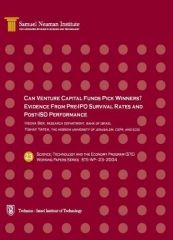
This paper evaluates the ability of venture capital funds to identify and bring to market successful high-tech Israeli companies during the period 1991 to 2000. Using a newly constructed and highly detailed database we find that: (1) The probability of survival until the IPO stage is higher for venture-backed companies. (2) According to several different […]
Immigrants in the Hi-Tech Sector: Comparison to Natives and the Effect of Training STE-WP-22-2004
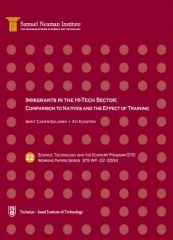
This paper provides a descriptive analysis of the integration of the immigrants from the CIS in the Israeli labor market and, specifically, in the hi-tech sector. The analysis is based on the national cross sectional Labor Force Survey and on a unique panel data that follows Russian engineers for up to twelve years in Israel. […]
Innovation and the Limits of State’s Power: R&D and Industrial Policy in taiwan in IC Design and Software STE-WP-21-2004
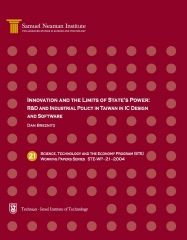
Of the East Asian Newly Industrialized Countries (NIC) Taiwan story is one of the most inspiring. In almost all accounts of Taiwan, the state has been described as the major impetus of economic development and technological upgrading. The Taiwanese government policy goal in the last decade has been to spur more new-products innovation capabilities. This […]
Evolutionary Venture Capital Policies: Insights from a Product life Cycle Analysis of Israel’s Venture Capital Industry, Science, Technology and the Economy Program (STE) – Working Papers Series STE-WP-20-2003
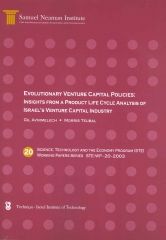
The significance of VC as a component of the Silicon Valley model of high tech has led many countries during the 80s and 90s to implement government policies aimed at stimulating this activity. This paper suggests that a major factor in the failure of many of these policies to create an early phase, high tech […]
A Micro-Economic Approach to Government Support of R&D Investments in the Private Sector, Science, Technology and the Economy Program (STE) – Workin
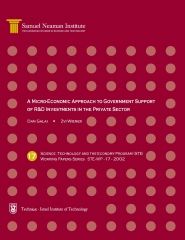
This paper focuses on the economic decisions of the government to subsidize investments in the private sector, and to discriminate among firms in its support programs. The presumption is that, by taxing corporate profits the government, affects investment decisions made by corporations and causes them to invest less than what would be socially optimal. Accordingly, […]
The Impact of R&D Spillover on Growth and Productivity in Israeli Manufacturing Industries 1990-1994, Science, Technology and the Economy Program (STE) – Working Papers Series STE-WP-14
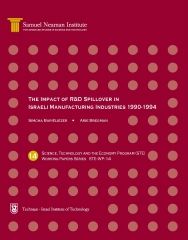
The study presents the positive external effects (spillovers) of investments in research and development in manufacturing industries, in Israel and abroad. This examination quantifies the spillover of domestic and imported technologies, through intermediates and capital goods, to establishments that did not participate directly in the research and development process. The analysis examines the interactions between […]
Universal Banking and Investment in R&D Intensive Companies an Empirical Analysis STE-WP-15 , 2002

This study provides a new insight to why Israeli R&D intensive companies float their equity on foreign markets. A variety of studies have tackled this issue but very few discuss the relationship between strong universal banks who dominate various areas of the financial sector and availability of funds for commercially driven technology research. The study […]
Incentives and Invention in Universities, Science, Technology and the Economy Program (STE) – Working Papers Series STE-WP-18-2003
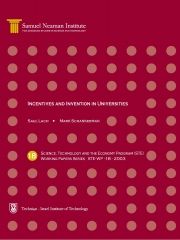
We show that economic incentives affect the number and commercial value of inventions generated in universities. Using panel data for 102 U.S. universities during the period 1991-1999, we find that universities which give higher royalty shares to academic scientists generate more inventions and higher license income, controlling for other factors including university size, quality, research […]
Financing R&D in Mature Companies: An Empirical Analysis, Science, Technology and the Economy Program (STE) – Working Papers Series STE-WP-10
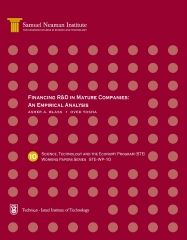
R&D intensive firms are often described as (1) relying mainly on equity financing; (2) investing primarily in intangible assets; (3) exhibiting a high market to book ratio (a high Tobin’s q); and (4) as being young and fast growing. We put these commonplace characterizations to systematic empirical tests. For our sample of Israeli manufacturing firms […]
